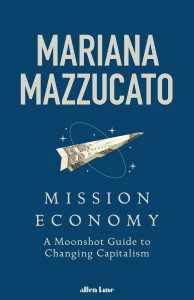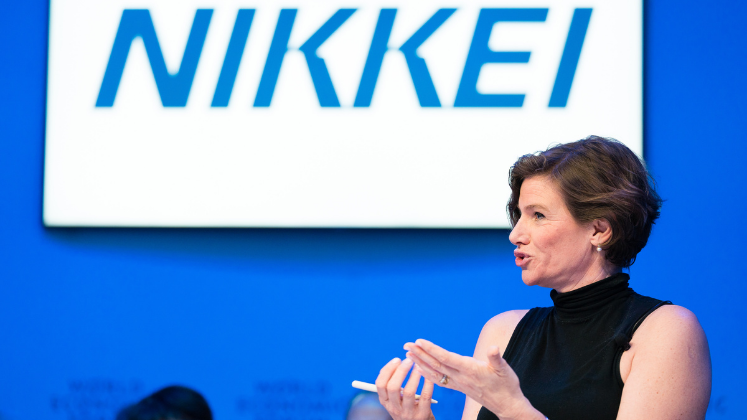LSE MSc Environmental Policy and Regulation candidate, Flora Parkin, reviews Mariana Mazzucato’s new book, Mission Economy: A Moonshot Guide to Changing Capitalism, and questions whether it goes far enough to tackle the worsening global climate crisis.
This review was originally posted on the LSE International Development blog. If you are interested in this book, you can also watch a video of Mariana Mazzucato’s guest LSE lecture, recorded on 5 March 2021.
Mission Economy: A Moonshot Guide to Changing Capitalism. Mariana Mazzucato. Allen Lane. 2021.
 As the UK prepares to host November’s crucial COP26 climate summit, international governments are under pressure to deepen their carbon-reduction targets amidst a worsening climate crisis. The mood music seems to finally be shifting on green issues, with financial markets going green, the UK Treasury reporting on biodiversity and even Bill Gates weighing into the conversation. However emissions continue to rise, and a gnawing feeling remains that central governments are dragging their feet on actions that meet the scale of the challenge.
As the UK prepares to host November’s crucial COP26 climate summit, international governments are under pressure to deepen their carbon-reduction targets amidst a worsening climate crisis. The mood music seems to finally be shifting on green issues, with financial markets going green, the UK Treasury reporting on biodiversity and even Bill Gates weighing into the conversation. However emissions continue to rise, and a gnawing feeling remains that central governments are dragging their feet on actions that meet the scale of the challenge.
Enter Mariana Mazzucato, and her timely new book Mission Economy: A Moonshot Guide to Changing Capitalism. Part policy critique, part manifesto, Mission Economy reinvigorates the role of the state for tackling today’s complex problems, demanding vision, ambition and public purpose in economic strategy. The book is short, accessible and written with an urgency befitting this time of crises. But as persistent constraints continue to limit green policy at national and international levels, can Mazzucato’s approach unlock much needed systemic transitions, and work at the global scale?
Mazzucato starts by diagnosing our dysfunctional form of contemporary capitalism, fuelled by and fuelling climate crisis. She identifies four drivers of this dysfunction: 1) finance sector short-termism; 2) the financialisation of business and value; 3) fossil fuel dependency; and 4) slow or absent governments. Lamenting the UK’s ‘infantilised’ civil service and the depletion of Western governments through dereglation and outsourcing, Mazzucato highlights a toxic, self-fulfilling prophecy at play: ‘the less government does, the less it takes risks and manages, the less capacity it develops, and the more boring it is to work for’ (49). The resulting drain limits public sector leadership, and possibilities for green strategy.
Mazzucato is on home turf in tying these present-day deficiencies to corrosive myths contrasting ‘public vs. private’, characterising government as incompetent. Mission Economy offers free-flowing empirical examples of how these myths serve to undermine the green transition. Through examples in the UK alone – such as the undervaluation of off-shore wind farms due to cost miscalculation, to the UK’s failed COVID-19 track-and-trace system – she demonstrates the limits of outsourcing and privatisation, arguing instead for bold public investment at the high-risk, uncertain, experimental phases of innovation. When made strategically in line with a vision, such investments can catalyse ‘spillovers’ and learning benefits across the economy, analogous to visions for a Green New Deal (something she discusses extensively in the book).

Image Credit: ‘Davos 2020′ showing Mariana Mazzucato, Professor of Economics of Innovation and Public Value; Founder and Director, Institute for Innovation and Public Purpose, University College London (UCL) speaking in the How to Measure a New Economy session at the World Economic Forum Annual Meeting 2020 in Davos-Klosters, Switzerland, 23 January. Licensed by UCL Institute for Innovation and Public Purpose under CC BY NC 2.0.
The cornerstone of her argument is the case study from which the book takes its name: the Apollo mission to put a man on the moon. From its start in 1962, President John F. Kennedy was explicit that this mission would be hard, cost a lot of money, that things would go wrong, but that its beneficial spillovers for society would be worth it. The mission had purpose, and inspired a generation. Innovation occurred across computing, communications and electronics, bringing about the IT revolution, while innovations in textiles and nutrition are still with us today. Mazzucato identifies six key lessons for tackling complex problems from Apollo, developing them into principles for a new political economy: 1) vision and a strong sense of purpose; 2) risk taking and innovation; 3) organisational dynamism; 4) cross-sectoral collaboration; 5) outcomes-based budgets and long-term horizons; and 6) dynamic public-private partnerships. Mazzucato goes on to explore the ways these can apply to present day net-zero strategies, green city programmes and missions to achieve the sustainable development goals.
In media interviews around the book launch, Mazzucato found herself regularly correcting interviewers about the reason for focusing on Apollo: it demonstrates a dynamic, visionary, innovative role for the public sector, in contrast to common perceptions of incompetence and weakness. However Mazzucato stresses that today’s challenges are more holistic than Apollo, and ‘require more citizen engagement in the vision of the mission itself’ (199). Citizen engagement is placed at the heart of Mazzucato’s mission-setting process. Designing more democracy into institutional processes enables Mazzucato to avoid a preoccupation with technocratic institutional reform, with the implication being that democracy enables just outcomes, and a progressive political economy.
But is this enough? Like her contemporary Kate Raworth’s Doughnut Economics, this mission-oriented approach eschews old political ideologies, focusing on public participation as a means to deliver a more just capitalism. What gets left out, however, is an account of power, and how power shapes the policy process – including at the level of public participation. A dysfunctional capitalist system is not simply down to insufficient policy ideas and low public sector self-confidence. The role of corporate and institutional power in preventing proposals akin to those Mazzucato advocates here (patient long-term financing, high-risk public equity stakes in start-ups, ‘insourcing’ public service provision) goes unexamined, in favour of working solely with the willing. This begs the question: what is the strategy for states to reclaim power ceded to global financial markets, lobbying networks and corporate elites, to pursue systems change?
Mission-oriented approaches may also be less viable in developing country contexts. Mazzucato’s main reference points are the UK, the EU and the US, yet in the context of international climate mitigation, decarbonisation also depends on fostering low-carbon pathways for developing countries. Here, her advocacy of Modern Monetary Theory (MMT) to expand opportunities for public investment seems narrowly applicable. MMT is a theory designed for countries in sovereign control of their currencies, rendering its implications inaccessible for economies pegged to external currencies, or where spending is constrained by debt obligations and donor funding conditionalities. Beyond MMT, assertive industrial strategy may also be complicated for countries with less established institutions, while this lack of institutional capacity could also make participatory policy design harder to achieve.
In the UK context at least, a mission-oriented approach could catalyse visionary, green industrial strategy. Such an approach must be accompanied by an account of power, and in the context of international climate efforts, Mazzucato’s recommendations might not be widely accessible. Mission Economy is undoubtedly successful, however, in articulating a practical framework for ambitious, state-led climate strategy, and in Mazzucato’s infectious enthusiasm to do things differently.
Note: This review gives the views of the author, and not the position of the LSE Review of Books blog, or of the London School of Economics.








2 Comments